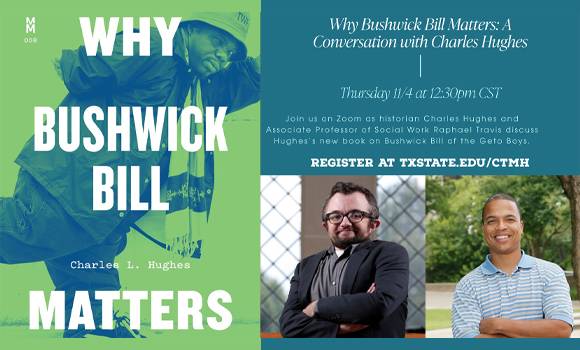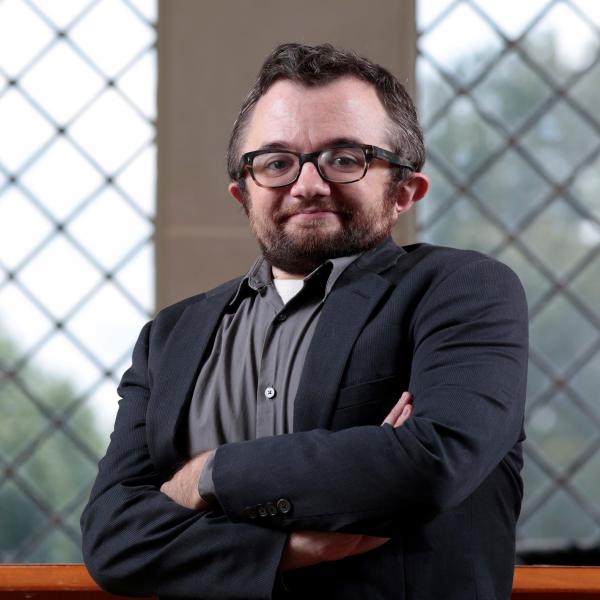Why Bushwick Bill Matters:
A Conversation with Charles Hughes
Thursday, November 4, 2021 | 12:30 pm
Online via Zoom
Why Bushwick Bill Matters:
A Conversation with Charles Hughes
Thursday, November 4, 2021 | 12:30 pm
Online via Zoom

Historian Charles Hughes's new book Why Bushwick Bill Matters chronicles the life and cultural significance of Bushwick Bill of the pioneering Houston hip-hop group the Geto Boys. Hughes contends that Bushwick Bill remixed spectacle as he exposed and exploited ableist and racist assumptions to become a singular voice in rap and the relentless battle over free speech in the United States. The resulting portrait is of a complicated artist who displayed defiance and humor, compassion and anger, in equal measure. The Memphis-based historian will be in virtual conversation with Associate Professor of Social Work Raphael Travis, author of The Healing Power of Hip-Hop.
 Charles Hughes is the Director of the Lynne and Henry Turley Memphis Center at Rhodes College. Dr. Hughes received his Ph.D. in U.S. History from the University of Wisconsin-Madison in 2012, and previously served as the Turley Memphis Center's Andrew W. Mellon Postdoctoral Fellow. His acclaimed first book, Country Soul: Making Music and Making Race in the American South, was named one of the Best Music Books of 2015 by Rolling Stone and No Depression, one of Paste Magazine’s Best Nonfiction Books of the Year, and one of Slate’s “Overlooked Books” of 2015. He has published essays and given numerous talks in front of a range of audiences, including featured engagements at the Center for Southern Culture at the University of Mississippi, the Center for the Study of the American South at the University of North Carolina, and the Rock & Roll Hall of Fame Library & Archives. He is currently working on a book about the history of African-Americans and professional wrestling in the United States.
Charles Hughes is the Director of the Lynne and Henry Turley Memphis Center at Rhodes College. Dr. Hughes received his Ph.D. in U.S. History from the University of Wisconsin-Madison in 2012, and previously served as the Turley Memphis Center's Andrew W. Mellon Postdoctoral Fellow. His acclaimed first book, Country Soul: Making Music and Making Race in the American South, was named one of the Best Music Books of 2015 by Rolling Stone and No Depression, one of Paste Magazine’s Best Nonfiction Books of the Year, and one of Slate’s “Overlooked Books” of 2015. He has published essays and given numerous talks in front of a range of audiences, including featured engagements at the Center for Southern Culture at the University of Mississippi, the Center for the Study of the American South at the University of North Carolina, and the Rock & Roll Hall of Fame Library & Archives. He is currently working on a book about the history of African-Americans and professional wrestling in the United States.
 Raphael Travis is an Associate Professor and BSW Program Director at Texas State University in the School of Social Work. His research, practice, and consultancy work emphasize healthy development over the life-course, resilience, and civic engagement. He also investigates creative arts, especially Hip-Hop culture, as a source of health and well-being for individuals and communities. He is author of the book The Healing Power of Hip Hop. The Collaborative Research for Education, Art, and Therapeutic Engagement (CREATE) Lab, led by Dr. Travis, partners with researchers, educators, and artists focused on better understanding the educational, health, and therapeutic benefits of music and art engagement. The CREATE Lab has multiple active research projects including studies that build upon the lab’s music studio with professional quality music technology, hardware and software that makes constructing, recording, remixing, and other ways of engaging music possible.
Raphael Travis is an Associate Professor and BSW Program Director at Texas State University in the School of Social Work. His research, practice, and consultancy work emphasize healthy development over the life-course, resilience, and civic engagement. He also investigates creative arts, especially Hip-Hop culture, as a source of health and well-being for individuals and communities. He is author of the book The Healing Power of Hip Hop. The Collaborative Research for Education, Art, and Therapeutic Engagement (CREATE) Lab, led by Dr. Travis, partners with researchers, educators, and artists focused on better understanding the educational, health, and therapeutic benefits of music and art engagement. The CREATE Lab has multiple active research projects including studies that build upon the lab’s music studio with professional quality music technology, hardware and software that makes constructing, recording, remixing, and other ways of engaging music possible.